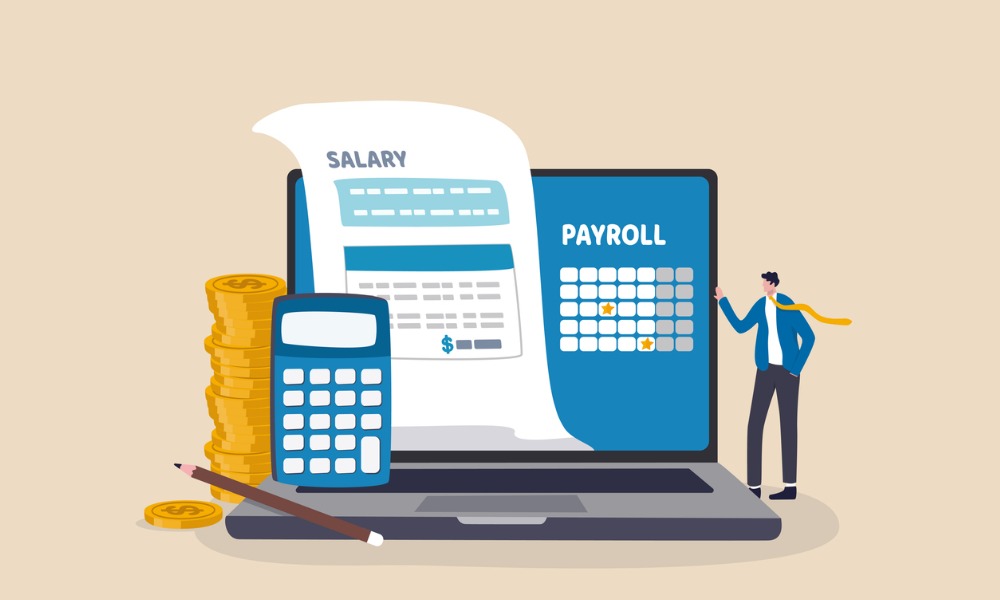
Lack of understanding paycheque deductions creates sense of 'tax anxiety,’ finds report

Many Canadians seem unaware about the rules around tax deductions from their paycheques, according to a recent report.
Less than a third (32%) of Canadians say they're diligent about checking their paycheque to ensure tax and other deductions, and just 29% say they feel confident that they would notice an error in tax or other deductions on their paycheque, reports H&R Block Canada.
Just over half (52%) say that they don't review their T4 to ensure all the deductions such as tax, insurance, and pension-related contributions are correct; this compares to 48% who say they're diligent in reviewing their T4.
Also, 35% of Canadians say they don't know how to check the exact amount that should be deducted from their paycheque, and 21% only focus on tax deduction accuracy for the prior year when it comes to filing their taxes.
“It's apparent that a large portion of Canadians don't feel well-equipped to ensure accuracy of their paycheques or T4s – or, in knowing how to maximize putting money back into their pockets when filing their taxes,” says Yannick Lemay, tax expert at H&R Block Canada.
“The reality is, we don't typically learn about navigating our paycheques and income taxes at school. Canadians at every stage of life should feel empowered to speak with their employer or tax expert to gain a clear understanding of how their paycheque works and how their taxes are calculated."
The new Canada Revenue Agency administrative policy came into effect on Jan. 1 and determines a remote employee's province or territory of employment (POE) for payroll reasons. The policy will allow the CRA to determine the correct province to file an employee's income taxes, pension, and EI.
More than a third of Canadians are unsure of what tax and other deductions should be, according to H&R Block Canada’s new report.
Nearly half (46%) of Canadians say they're relying on a refund following a tough financial year or due to pressures from increased cost- of-living. They report a mix of ways they plan to use their refund including:
However, while 36% of Canadians (36%) expect a refund this tax filing season, 54% say they have no idea whether they'll owe money or receive a refund. And only 30% of respondents say they've put aside money in case they do owe.
Also, around 17 million adult Canadians aren't confident that they can maximize their tax refund without a tax expert.
This year, over two in five (43%) gig workers say they're willing to take the risk of not declaring “all” gig work-related income, and a further 32% are willing to take the risk of not declaring “any” gig-related income, according to a previous report from H&R Block Canada.
More than one in four Canadians (28%) indicate that they don't know the date that tax filing season kicks off (the first day that Canadians can file taxes for the year prior), and 15% aren't sure of the filing deadline. Only 14% feel very confident they know how to leverage all available tax credits and benefits to maximize their refund, and 49% don’t feel confident.
"With more than 400 available tax credits and benefits - and new and evolving credits and benefits every year - it's not surprising that the majority of Canadians don't feel confident they're able to maximize their tax refunds," says Lemay. "The most important thing is to file as early as possible to give yourself enough runway to ensure you leverage every possible tax credit and benefit you're entitled to."
Here’s a breakdown of payroll taxes by Canadian province and territory, according to ADP
|
Canadian province/territory |
Standard payroll taxes |
|
Alberta |
|
|
British Columbia |
|
|
Manitoba |
Canadian Pension Plan, Employment Insurance, Income tax |
|
New Brunswick |
|
|
Northwest Territories |
|
|
Nunavut |
|
|
Newfoundland & Labrador |
Canadian Pension Plan, Employment Insurance, Income tax |
|
Nova Scotia |
|
|
Ontario |
|
|
Prince Edward Island |
|
|
Quebec |
Commission des normes, de l'équité, de la santé et de la sécurité au travail (CNESST) Contributions Related to Labour Standards Employment Insurance, Income tax |
|
Saskatchewan |
|
|
Yukon |